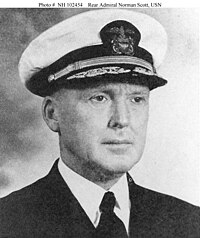Norman Scott (admiral)
| Norman Scott | |
|---|---|
 
Rear Admiral Norman Scott c.1942
|
|
| Born |
August 10, 1889 Indianapolis, Indiana |
| Died | November 13, 1942 (aged 53) Guadalcanal, Solomon Islands |
| Place of burial | At sea |
| Allegiance |
|
| Service/branch |
|
| Years of service | 1911 – 1942 |
| Rank |
|
| Battles/wars |
World War I World War II * Naval Battle of Guadalcanal † |
| Awards |
Medal of Honor Purple Heart |
Norman (Nicholas) Scott (August 10, 1889 – November 13, 1942) was a Rear Admiral in the United States Navy, and was one of only two U.S. Navy admirals killed in action during a surface battle in World War II. Scott posthumously received the Medal of Honor for his actions in the Pacific Theater of World War II.
Scott was born August 10, 1889 in Indianapolis, Indiana. Appointed to the Naval Academy in 1907, he graduated four years later and received his commission as Ensign in March 1912. During 1911–13, Ensign Scott served in the battleship USS Idaho (BB-24), then served in destroyers and related duty. In December 1917, he was Executive Officer of USS Jacob Jones (DD-61) when she was sunk by a German submarine and was commended for his performance at that time. During the rest of World War I, Lieutenant Scott had duty in the Navy Department and as Naval Aide to President Woodrow Wilson. In 1919, while holding the temporary rank of Lieutenant Commander, he was in charge of a division of Eagle Boats (PE) and commanded Eagle PE-2 and Eagle PE-3.
During the first years of the 1920s, Norman Scott served afloat in destroyers and in the battleship USS New York (BB-34) and ashore in Hawaii. From 1924 to 1930, he was assigned to the staff of Commander Battle Fleet and as an instructor at the Naval Academy. He commanded the destroyers USS MacLeish (DD-220) and USS Paul Jones (DD-230) in the early 1930s, then had further Navy Department Duty and attended the Naval War College's Senior Course. After a tour as Executive Officer of the light cruiser USS Cincinnati (CL-6), Commander Scott was a member of the U.S. Naval Mission to Brazil in 1937-39. Following promotion to the rank of Captain, he was Commanding Officer of the heavy cruiser USS Pensacola (CA-24) until shortly after the United States entered World War II in December 1941.
...
Wikipedia
